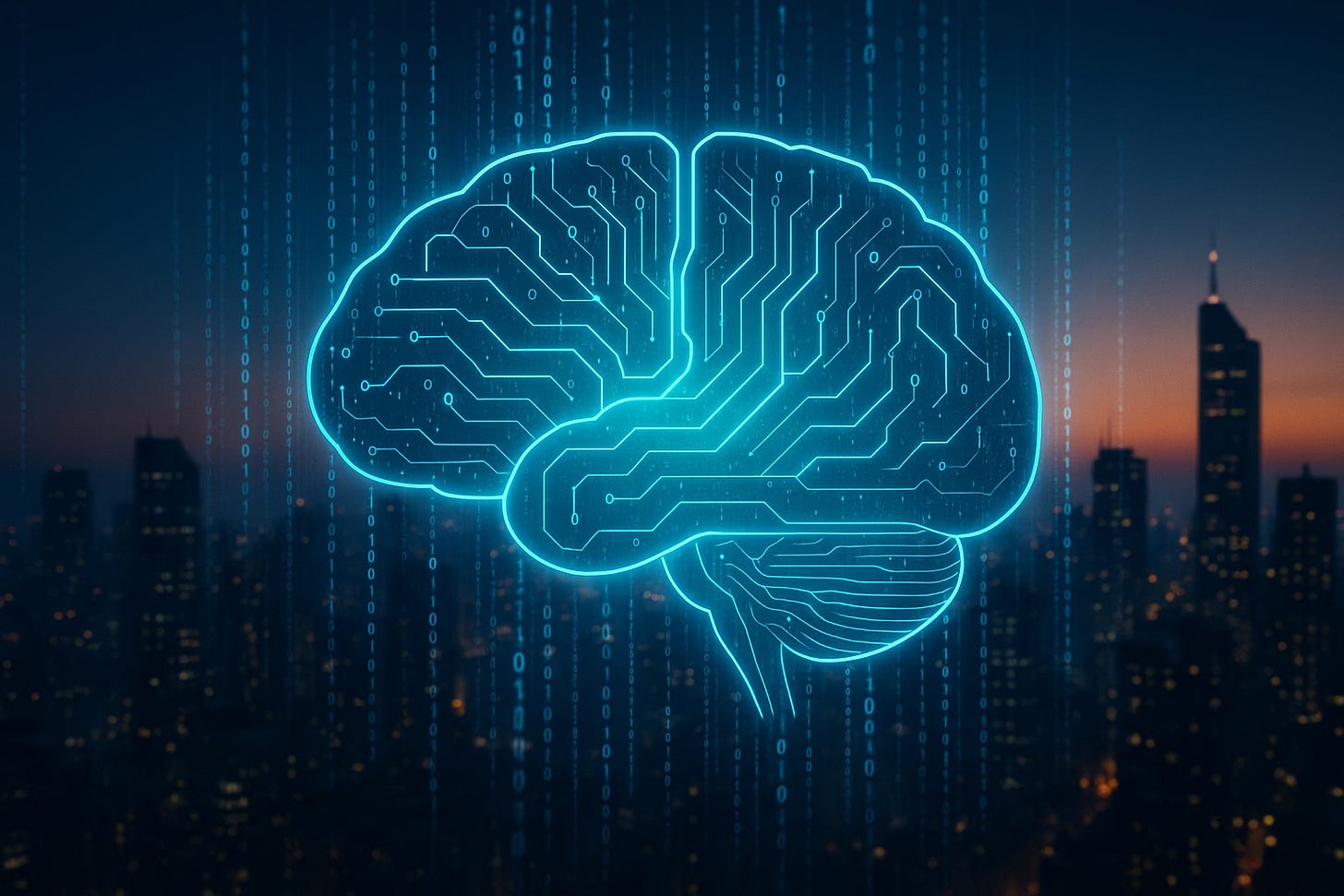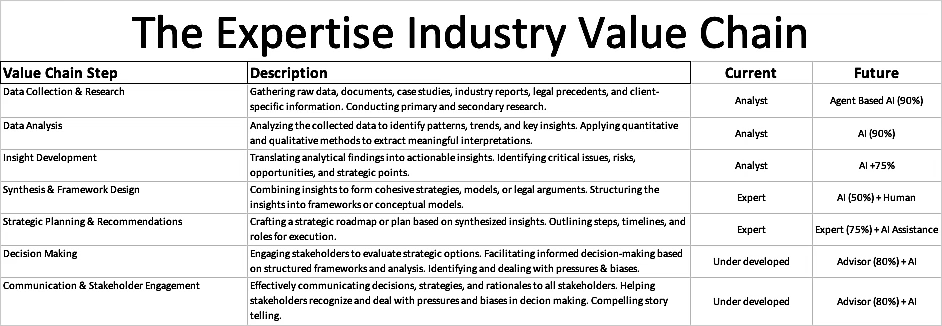Think You Know the Future of Expertise? Think Again
“The real problem is not whether machines think, but whether men do” — B.F. Skinner
In expert-based industries—where the core service is delivering an assessment, recommendation, and a plan—it’s easy to see how AI will have a dramatic impact. Management consultants, financial advisors, lawyers — AI will automate the industry!
What will replace these traditional expert services and roles? Will investment advisors, lawyers, and management consultants all become “robo-advisors,” driven primarily by AI-powered self-service applications?
AI is automating the mundane to complex tasks and driving new efficiencies in these expert services. Yet, amid the excitement, a fundamental question remains unanswered: Will AI truly replace human expertise, or will it reshape it in unexpected ways?
As we navigate this AI landscape, the challenge isn’t just leveraging AI’s power—it’s understanding its limits and, more importantly, how human judgment fits into the equation and this creates a new category opportunity.
The Human Factor: Bias, Pressure, and Judgment
Despite the transformation AI brings to information analysis, it doesn’t change human nature. High-stake decisions—about investments, legal situations, or strategic moves—are still made by humans — the buyers and clients of these expertise services. Decades of behavioral science show that these clients are wired to make choices influenced by emotions, biases, incentives, and pressure.
Decisions, especially high-impact decisions involving big bets, are not ruled by rational facts.
Consider some common biases which play a key role in decision making:
We feel losses more deeply than gains (loss aversion)
We trust our instincts too much (overconfidence)
We cling to initial impressions (anchoring)
We follow the crowd (herd mentality)
We give undue weight to recent events (recency bias)
We gravitate towards information that confirms what we already believe (confirmation bias).
And many more
The bigger the decision, the bigger the opportunity for pressures and biases to have significant influence.
Now, factor AI into this human equation. An AI robo-advisor might recommend a bold move, but if it triggers loss aversion, the client might freeze. Or, when an AI’s suggestion aligns with a leader’s bias, it can create a false sense of confidence.
The risk isn’t just flawed AI—it’s how the clients interpret and act on it.
The New Value: Independent Perspective
As AI efficiently handles the “what” of information analysis and recommendation generation, human experts are set to focus on the “how”—bringing an independent perspective that delivers two critical outcomes, that are largely underserved today.
First, experts will help clients recognize the pressures, biases, and cognitive traps they of decision making, especially in high-stakes decisions (aka Big Bets).
Second, they will introduce external perspectives, stories and scenarios that challenge the base-case analysis, enabling clients to see beyond the data and consider alternative scenarios.
This shift redefines the job-to-be-done in the expertise industry. Instead of spending 80% of their effort (& budget) on analysis and recommendations and just 20% on advising, experts will invert this ratio: 20% on analysis and 80% on guiding clients through the decision-making process.
This opens up a new value proposition for the expertise industry. The goal is to help clients not only make better choices but also to clearly justify those choices to stakeholders. In this new paradigm, expertise moves from being a knowledge provider to a strategic advisor—helping clients navigate ambiguity and prioritize risk and value in their decisions.
The Challenge for the Incumbents
Here’s the next question: Are today’s leading firms ready to make this shift? Or will they cling to old models while newer, more adaptable players move ahead?
You already know the answer.
They will “intend and pretend” to lead the change —these are smart people and organizations with numerous advantages. Yet, we know the anwer.
Winners of one era don’t lead in the next. Period.
There will be disruption.
Peter Thiel’s Contrarian Question
In Zero to One, Peter Thiel challenges innovators with a fundamental question:
"What important truth do very few people agree with you on?"
Here’s my answer to Thiel’s question:
Most believe that AI will automate, shrink expertise-based industries and turn it into a product market.
I believe the exact opposite—AI will greatly expand the expertise industry.
AI will not just increase the revenue and size of the expertise sector; it will also expand the total addressable market. How?
As AI shifts the value chain dynamics of expertise industries, world-class advisors—combining AI-driven analysis and recommendations with decision-making and communication coaching—will gain unprecedented access to small and midsized company executives.
This evolution will enable them to deliver the same level of rigorous, high-quality analysis and recommendations (done at the speed of AI), combined with the decision-making coaching needed for high-stakes situations.
In short, AI will make world-class strategy analysis and advice accessible at a scale never before possible. And this will multiply both the ROI and market.
Join me at the Imagine AI Live Conference in Las Vegas on May 28, 29, and 30 to hear my vision for the future of strategy consulting—and why AI is not a threat, but a catalyst for growth.
Onward!
John
About The Digital Leader Newsletter
This is a newsletter for change agents, strategists, and innovators. The Digital Leader Newsletter is a weekly coaching session focusing on customer-centricity, innovation, and strategy. We deliver practical theory, examples, tools, and techniques to help you build better strategies, better plans, and better solutions — but most of all, to think and communicate better.
John Rossman is a keynote speaker and advisor on leadership and innovation. Learn more at www.bookjohnrossman.com







